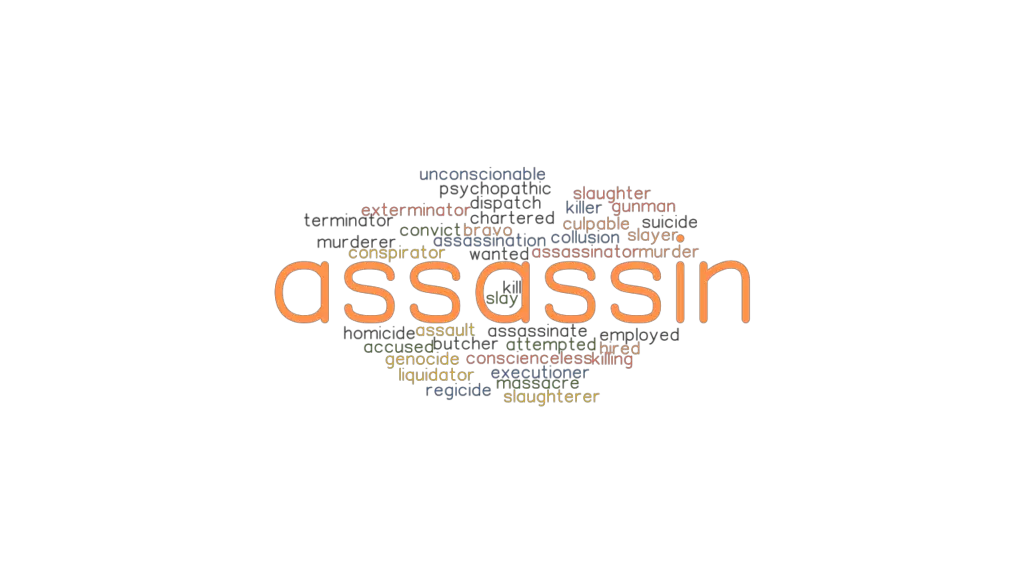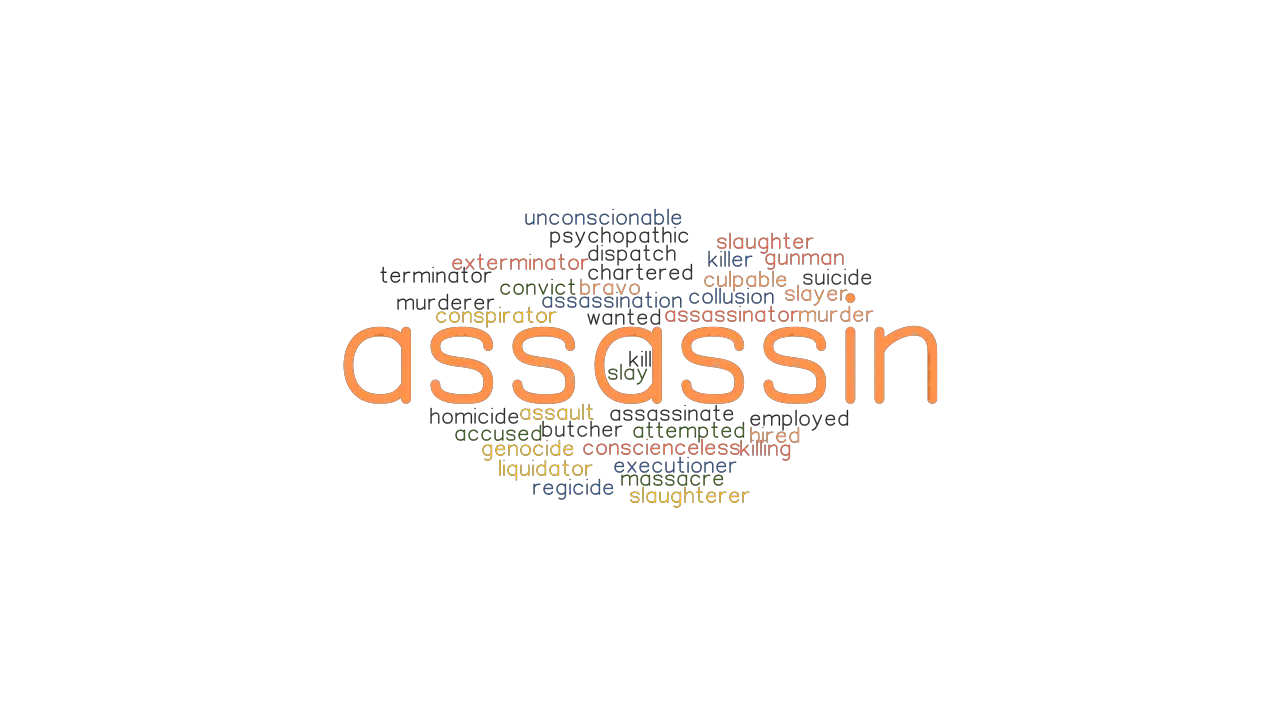Assassin Synonyms
Could the shadows of history be any darker, more chilling than those cast by the act of assassination? The calculated removal of a human life, often a prominent figure, for political gain or ideological fervor, leaves an indelible stain on the tapestry of civilization, a testament to the depths of human depravity and the fragility of power.
The term "assassin" itself, a word that carries an inherent weight of dread, has roots that twist back through time, originating in the Levant, associated with a prince of the Arsacid dynasty. This prince, known as the "Old Man of the Mountain," held sway over a group of devoted followers, instilling in them a willingness to commit acts of violence in the name of their cause. The historical narrative of these "assassins" paints a vivid picture of fanaticism, religious zealotry, and the willingness to employ murder as a tool of political manipulation. These are historical facts, an undeniable truth.
The act of assassination, in all its forms, is a multifaceted phenomenon. It is a crime of premeditation, a calculated act of violence. It is the ultimate denial of the right to life. While the reasons behind an assassination can vary, the consequences are always profound. Political assassinations can destabilize governments, trigger civil unrest, and alter the course of history. Assassinations can become pivotal moments in history.
| Category | Details |
|---|---|
| Definition | A person who commits murder, especially of a public or political figure. |
| Purpose | To eliminate an opponent, to seize power, to advance a political agenda, or to instill terror. |
| Motivation | Political, ideological, religious, financial, or personal. Can be motivated by a fanatical adherence to a cause or driven by the lure of money. |
| Historical Context | The word "assassin" originates from the Levant, linked to a prince of the Arsacid dynasty, known as the "Old Man of the Mountain." He used violence to further his agenda. |
| Synonyms | Murder, killing, slaughter, slaying, extermination, homicide, manslaughter, butchery, liquidation, elimination. (Thesaurus.com lists numerous alternatives) |
| Impact | Can lead to instability, social unrest, significant historical changes. Can destabilize governments and trigger conflicts. |
| Legal Ramifications | Murder is a severe crime with severe penalties, including imprisonment or the death penalty, depending on the jurisdiction. |
| Examples in French | "On a poursuivi les assassins." (The assassins were pursued.) "Il est tomb sous les coups d'un assassin." (He fell under the blows of an assassin.) "Il a t bless par un assassin." (He was wounded by an assassin.) |
The act of assassination, the killing of a person, especially a public or political figure, is not only a criminal act but also a potent symbol of power struggles. It can be a desperate measure of last resort or a carefully planned tactical move in a high-stakes game. The history of humanity is littered with the shadows of these acts, from the murder of Julius Caesar to the assassination of John F. Kennedy. Each act of violence is a singular event, but it resonates across time, echoing the depths of human motivation and the fragility of the social and political order. The use of the word itself is loaded.
One of the complexities of the term assassin is the varying motivations that drive individuals to commit such acts. Money can often play a role. The allure of financial gain, the offer of a significant sum for a targets elimination, has spurred countless plots. Political assassinations, committed to further a specific agenda, are a testament to the lengths some individuals will go to achieve their goals. These may be motivated by deeply-held beliefs, a willingness to die for a cause, or the desire to shift the balance of power within a society. The idea of fanatical adherence to a cause has been a driving factor for numerous assassinations. In these situations, the assassins actions are driven not by personal gain but by a desire to promote their ideals, whether religious or ideological. Such actions reveal the dangerous mix of belief and action.
The study of assassination requires not only knowledge of the events themselves but also of the broader political and social context in which they occur. Every assassination is a historical event, a part of a larger narrative. The rise and fall of empires, the shifting alliances of nations, the social and economic forces that shape societies all impact the occurrence of assassination, and how they are viewed. When we examine the context of any assassination, we get a better understanding of the forces at play, from economic disparities to ideological conflicts. The understanding of these forces are key to gaining insight.
Consider the case of political assassinations. These often occur during times of political turmoil, when the existing power structures are challenged. The motivations of the actors involved are varied. They might be driven by a desire for power, a belief in a specific ideology, or simply by a sense of outrage. The targets often represent an obstacle to the assassin's goals. Understanding the specific factors involved is essential to fully comprehend the event. What we know about the motivations will shape our understanding, helping us to see the interplay of different factors that led to the act. The ripples of the effects are endless.
Furthermore, the study of assassination inevitably deals with the question of justice and morality. Assassination is an act of violence, a violation of human rights. Regardless of the motivations, the taking of a human life is a grave act. It raises profound questions about the nature of good and evil. What consequences should the assassin face? What about those who ordered or supported the act? These difficult questions highlight the complexity of the issues surrounding the act of assassination. The questions are tough ones, forcing us to confront our values.
The use of the word "assassin" itself can be complex. Sometimes, it has a specific meaning, the individual who murders a public figure for political or ideological reasons. It can also be used more broadly, to describe anyone who commits murder, especially for personal gain or because of fanaticism. Depending on the circumstances, different words can be used as synonyms. "Murder," "killing," "slaughter," "slaying," "extermination," "homicide," "manslaughter," "butchery," "liquidation," and "elimination" are all closely related terms. They highlight the many ways in which a life can be taken. The subtleties of language reveal nuances.
The linguistic exploration of the word and its related terms reveals a rich tapestry of meanings. The word "assassin" has a history that is deeply intertwined with the dynamics of power. It's a term that brings to mind images of darkness, conspiracies, and the dramatic interplay of history. The study of this act is a vital endeavor. Understanding its meaning helps us to address the darkest aspects of the human experience, helping us understand how it has shaped our present reality.
The term's origins, linked to the Levant and the "Old Man of the Mountain" present the complex cultural contexts that shape our understanding of it. The story of the assassins is a story of ideological fanaticism, political maneuvering, and the desperate pursuit of power. Those ancient assassins are, by all accounts, historical figures. In the context of contemporary times, this ancient story underscores the human capacity for good and evil. It reminds us of the ethical and moral obligations that come with every kind of power. We learn much from studying these historical facts, which are undeniable.
The French language offers a valuable insight into this subject. The phrases "On a poursuivi les assassins," "Il est tomb sous les coups d'un assassin," and "Il a t bless par un assassin," offer a glimpse into how these events are viewed within different cultural and linguistic contexts. These phrases reveal the way languages capture and reflect the complex emotions of humanity. Through the words, we explore the human experience. We see the universal resonance of tragedy.
The act of assassination is a recurring theme in literature, film, and other creative media. From the Shakespearean tragedies to modern-day thrillers, the story of the assassin is a rich source of drama. This also tells us something about our shared human experience. We examine the motivation, actions, and consequences of these violent acts. The many depictions and recreations also prompt a dialogue about morality and ethics. The creative expressions offer us different angles from which to consider the implications of the events. They offer powerful messages.
The study of assassination is far more than an examination of a single act; it's a journey into the intricacies of humanity. It helps us to confront our fears and anxieties, as well as the many elements that contribute to our society. By understanding the history, motivations, and impacts of these acts, we develop a deeper understanding of the political dynamics that shape our world. Such an exploration can also inform our understanding of human nature. It can also enhance our commitment to a safer, more just world.
To delve deeper into the many facets of the word "assassination" and its synonyms, consider consulting resources like Thesaurus.com, which lists 45 different ways to express the concept, along with antonyms, related words, and example sentences. This detailed exploration can broaden the understanding of the impact and significance of this topic.



